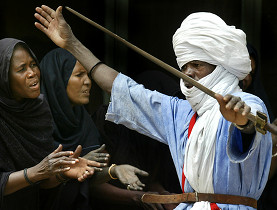Swiss hostage held in Mali freed

The Swiss national held hostage by al-Qaida extremists in Mali has been set free, the Swiss foreign ministry has confirmed.
The man was seized with three other people near the Mali border in Niger in January by a group calling itself al-Qaida in the Islamic Magreb (AQIM).
His Swiss wife was among two female abductees released in April.
The foreign ministry said in a statement that it that it was “relieved” and felt “great joy” that the efforts to free the man had been successful.
“Along with the relatives of the man concerned, the foreign ministry looks forward to his return home soon and wishes the family well,” it said.
The 57 year old, who lives near Zurich and has not been officially named, will now receive treatment from a doctor before returning to Switzerland, added the ministry.
The statement also thanked the authorities in Mali, as well as those in Switzerland for their work in securing the release.
Responsibility
Malian officials had initially blamed Tuareg rebels for abducting the two Swiss, a German woman and a British man in the Sahara region near Mali’s border with Niger on January 22. The tourists had been at a festival for Tuareg culture when they were taken from their car and driven to Niger.
But in February AQIM claimed responsibility for the kidnappings. The militant group also said that it was behind the abduction of Canadian United Nations envoy Robert Fowler and his aide Louis Guay, who went missing in Niger in December. Both have since been freed.
In May AQIM announced on a website that it had killed the remaining British hostage from the Sahara group, Edwin Dyer, and also threatened the life of the Swiss man.
Switzerland swiftly condemned the killing as a “barbaric act” but insisted this would not deter Bern from making “intense efforts” to seek the release of its national.
AQIM has been demanding the release of radical Muslim cleric Abu Qatada from a British prison. Qatada has been named by a Spanish judge as the right-hand man in Europe of Osama bin Laden’s al-Qaida network.
swissinfo.ch and agencies
Switzerland recognised Mali as an independent state in 1960 and the two countries established diplomatic relations in 1961.
Despite a number of bilateral treaties (trade, economic cooperation, mutual investment protection, civil aviation), economic exchange remained modest.
Since the late 1970s, Mali has been a priority country for Swiss development cooperation.
Through its coordination office in the capital, Bamako, the Swiss Agency for Development and Cooperation (SDC) supports projects in the areas of healthcare, sustainable management of natural resources and decentralisation. In 2005 the SDC also provided food aid.
Population: 12.3 million
Per capita GDP 2007: $449 (SFr522)
Swiss colony 2006: 62 people
Swiss exports 2006: SFr2.6 million
Swiss imports 2006: SFr3.35 million

In compliance with the JTI standards
More: SWI swissinfo.ch certified by the Journalism Trust Initiative










You can find an overview of ongoing debates with our journalists here . Please join us!
If you want to start a conversation about a topic raised in this article or want to report factual errors, email us at english@swissinfo.ch.